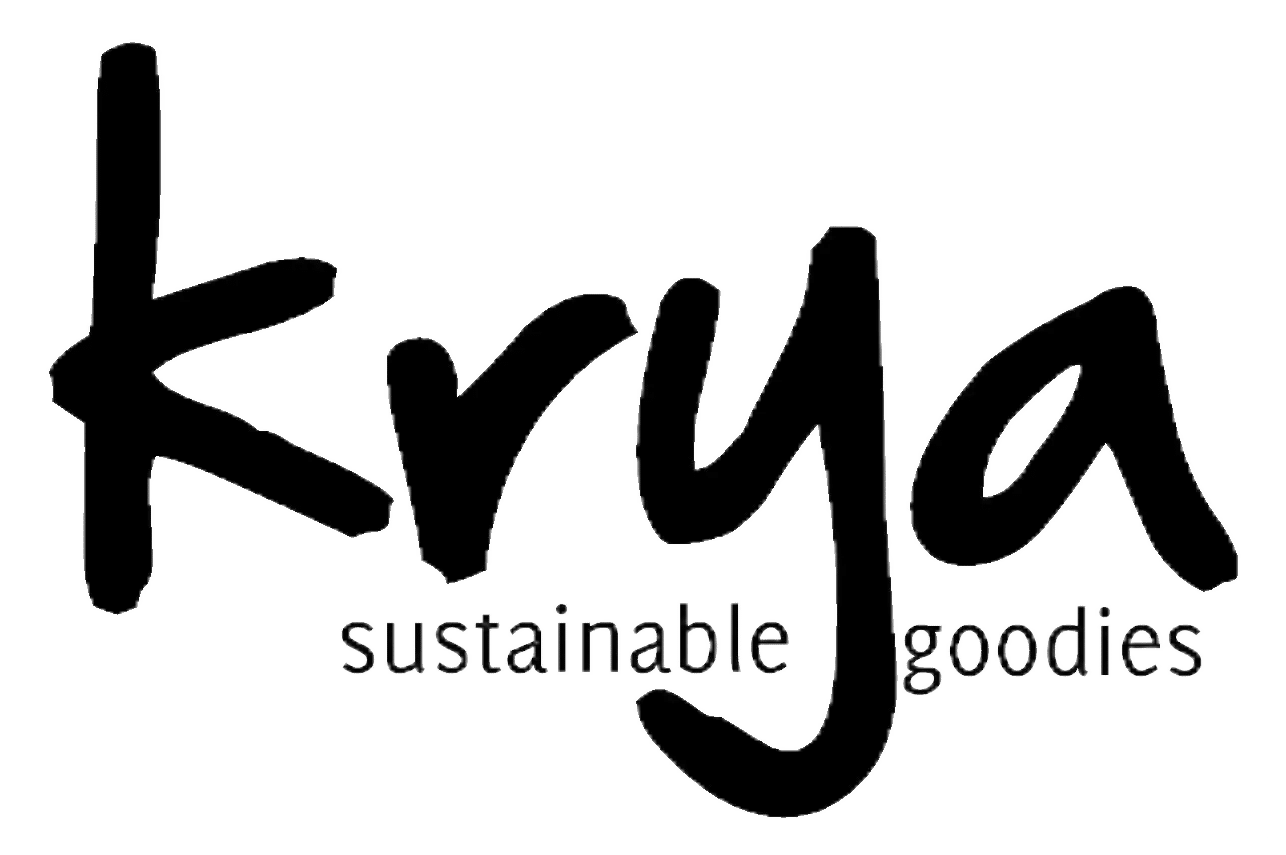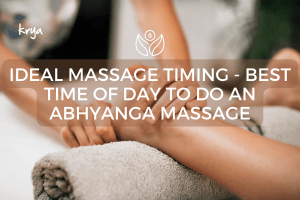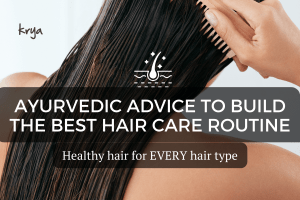This post was last updated on August 12, 2021 by Preethi Sukumaran
The practice of ayurvedic oiling , i.e using ayurvedic skin and hair oils is essential for maintaining skin and hair health. Regular ayurvedic oiling improves hair and skin health, helps restore and repair these organ systems, balances dosha imbalances and gives many other important health benefits for the body.
Ayurveda also recommends the balanced consumption of “sneha” or oils & fats to keep the bones and joints in good working condition. Certain organs like the brain and the eyes are high in fat composition so the regular intake of good fats is recommended to keep these organs in good working order.
Properties of different vegetable oils – as per Ayurveda
Every vegetable oil / fat has a different quality as per traditional medicine.
Cow ghee:
Cow ghee is considered tridoshic in its nature, and helps calm down pitta and vata without increasing kapha greatly. So if your skin and hair is extremely dry or chemically damaged, the addition of cow ghee in your diet will be very beneficial. To avoid aggravating Kapha, it is better to consume only melted cow ghee. Do keep in mind that this ghee should be made the ayurvedic way from the milk of hormone and antibiotic free, A2 desi cows only.
Sesame Oil:
Sesame oil is considered “the” base oil in Ayurveda. It goes into every external abhyanga, hair and skin formulation at Krya. Sesame is fantastic at balancing vata dosha, so if you have a lot of aches and pains, external application of sesame can go a long way in correcting this.
Sesame, however, can increase pitta – so if you have a high pitta constitution, it is better to cut down on the consumption of sesame seeds and oils, although you can continue to use this externally. High pitta dosha manifests itself as premature greying, balding, a quick volatile temper, skin that is dry due to excess heat, burning and inflamed skin conditions and hair that tends to have a reddish / brownish hue.
Coconut Oil:
Coconut oil is extremely nutritious and good for the body. Its composition is close to that of human breast milk, so it is very beneficial for the body. However, it is very cooling and can increase mucous in the body and also stimulates hair growth. So if you have a kapha prone body tend to catch colds easily and are also slightly hirsute, it is best not to apply coconut oil on the body.
In the Winter season, coconut oil is best avoided on skin for everyone. However, it can be used for the hair , after processing with herbs, as it helps stimulate hair growth and cools the brain, scalp and eyes.
Some issues with Sneha (vegetable oils and fats)
What we have stated above are facts given in the Samhitas. However, in modern times, the properties of these wonderful base oils are altered due to the way they have been extracted. Also, we have seen that each base oil comes with its own suitability issues.
Issues due to sourcing:
We have written a detailed post on Cow ghee and how it should be sourced and consumed. If we are having ghee made the commercial way where we are not extracting ghee from naturally fermented curd / cream, or sourcing ghee form hormone and antibiotic pumped A1 cows, then we will not get the benefits of ghee that are outlined in the Samhitas.
Issues due to the essential nature of Oils:
For example, Sesame oil is a wonderful base oil, but its essential nature is pitta aggravating. So in conditions of high Pitta aggravation, it is better to temper down the properties of Pitta present in sesame. Similarly, we have seen that Coconut is hair growth promoting but is also kapha aggravating. So how do we continue to use its beneficial properties without aggravating mucous or stimulating hair growth? Let us see how we tackle both of these problems at Krya.
Issues due to extraction method followed:
All commercial brands of cooking oil unfortunately follow the chemical extraction method where “food grade” hexane is used as a solvent to extract oil. In this method, an oil seed can release almost 70 – 80% of its oil content. The recovery process in the mechanical chekku / ghani is only upto 40%.
The solvent extraction process allows us to extract oil from even brand and husk, where oil content is very low – this explains how we are seeing new oils today like rice bran oil which were traditionally unheard of, as it is impossible to mechanically extract oil from rice bran using a chekku / ghani.
Cold pressed organic oils used at Krya : the first step towards ayurvedic oiling
We use only old fashioned chekku (in tamil) / ghani (in hindi) extracted oils that have been pressed from organically grown seeds. The chekku / ghani is a wooden press that uses mechanical pressure, sometimes aided by the use of cattle to squeeze out oil from an oil seed like copra, sesame seeds, mustard etc.
This kind of oil is also called a “cold pressed oil” although this is a misnomer strictly speaking as the chekku / ghani also generates a small amount of heat as the wooden crushes uses force to crush seeds and extract oil.
This “old fashioned” method of extracting oil is safe, retains the aroma of the oil and is extremely nutritious to the body.
Some of the qualities of a chekku / ghani extracted oil is that there is some degree of moisture preset in the oil. Also, the oil contains minute volatile compounds that oxidize releasing a characteristic aroma for each type of oil. As the oil ages and is exposed to oxygen, these volatile compounds start to ferment , so the oil with time will have a “riper” aroma and will eventually go rancid. This is why a chekku / ghani extracted oil will never have a shelf life of more than 9 months – it will start to go rancid.
A high quality, cold pressed oil pressed from organic seeds & nuts is the first important step in ayurvedic oiling.
Compare this with the 3 year shelf life of a hexane extracted oil – this oil has been chemically extracted, refined, bleached and deodorised to remove all its individual characteristics and has been made to unnaturally stay edible for 2 – 3 years.
If an external products company like Krya does not use commercially extracted oil for our hair and skin oils, then you should certainly not use these oils for edible purpose at home. Think of the effect using these oils can have on your body.
Transforming a vegetable oil for for ayurvedic oiling: Tila Paka veedhi process
By sourcing only cold pressed, ghani extracted vegetable oils from organically grown nuts and seeds, we are able to solve one part of the oil sourcing problem at Krya. We are able to avoid any chemical contamination and begin with only the purest and best form of the vegetable oil.
But how do we handle the fact that the vegetable oil is suitable only for certain prakrities? We widen its suitability and improve its bio-availability by cooking it with herbs to change its properties and make it suitable for ayurvedic oiling.
When the Tila Paka veedhi process is done correctly using the right herbs, the right process and the right temperature, the base vegetable oil TRANSFORMS. It becomes a potent, bio active rich oil by transferring the actives from herbs into the oils through this process. In this process, the base oil absorbs the properties of the herbs and its nature subtly transforms.
Depending upon the herbs used, we can make the oil less kapha aggravating (in the case of Coconut oil), and less intense (Sesame Oil). By judiciously formulating the right mix of base oils, herbs that go into the final oil, we can create an oil which is readily penetrative without being “teekshna” or intense, and which is nourishing / nurturing without enhancing mucous production. This is why we say that an oil made from an organic cold pressed oil and then further transformed using herbs by the Tila paka veedhi process is the ideal oil for ayurvedic oiling. When ayurvedic oiling is done with this kind of oil, you can see holistic and widespread benefits in hair, skin & health.
How is the Tila Paka veedhi process done?
The Tila Paka Veedhi is an ayurvedic oil manufacturing process. One of the reason this process is not used widely is because it is slow, and highly labour intensive . For example, it takes between 6 – 10 hours of SLOW boiling in the Tila Paka Veedhi process to get an oil ready for use. And it needs to be gently stirred throughout this time – so it is really tough to create but totally worth the effort.
When we do this process correctly, we start by extracting nutrients in 3 separate ways: through Herb deocotions (Kashayas), Herb Cold pressed Juices (Swarasas) and Herb churned pastes (Kalpa). Depending upon the herb you are incorporating into the oil, you should be following one of these 3 extraction methods which depends upon the nature of the herb. Juicy herbs lend themselves well to swarasas. Woody herbs to Kashayas.
Once the extraction is done correctly, each of these is added to the oil, and cooked with the oil, slowly stirring the oil mixture throughout the process. This disperses the actives which we have extracted into the oil. This also slowly and gently “nano-ises” the oil, breaking it down to smaller particles.
At the end of the process, the oil we get is highly potent and penetrative. Its texture, color and aroma are completely new and different from the base oil and it is absorbed very QUICKLY by skin and hair, allowing the body to absorb the nutrients we have so painstakingly extracted and incorporated.
To sum up:
In this blog post, we discussed the important topic of ayurvedic oiling and explained its importance in maintaining and improving skin and hair health. The Samhitas are emphatic about the many skin, hair and health benefits we can see with frequent and regular oil application.
But simply using a cold pressed oil may not be enough / suitable for us. There may be issues of dosha imbalance. Also, with the rampant use of harsh synthetics in the commercial extraction technique, these oils would be contaminated by these chemicals as well as the additives that are routinely added to vegetable oils.
We saw how we address both these important concerns at Krya . We source only authentic, organically grown cold pressed oils. We then process these oils using herbs in a special ayurvedic process called Tila Paka veedhi. Through this process, we transform the oil making it suitable across prakritis and also make it more potent, penetrative and therefore a much more effective product to help with skin and hair concerns.
If you too would like to experience the holistic benefits of ayurvedic oiling for hair & skin, do explore our wide range here. If you would like help choosing the right Krya oil for your skin / hair type, please call us (0-75500-89090) or write to us.












